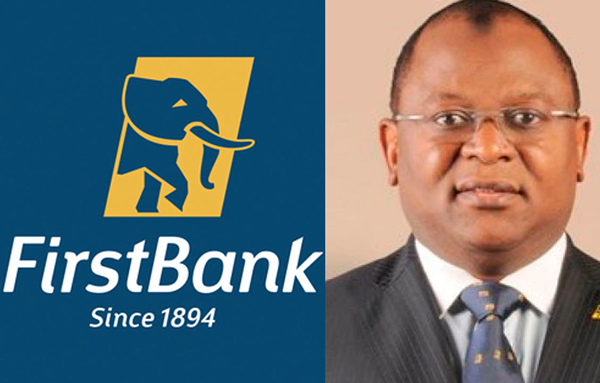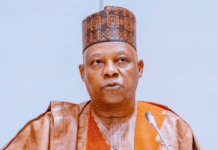It came like an innocent, harmless offer. But looking back now, Francis Nwufoh, the proprietor of an Abuja-based private school, Whiteplains British School, is wishing he never took it.
Today, the supposed harmless offer is the subject of a bitter legal battle between Mr Nwufoh and the management of First Bank Nigeria (FBN) over alleged forgery and fraud involving a N630 million credit now threatening the survival of the high-end school, located in Jabi, Abuja.
The loan was granted on June 26, 2013 by the Utako branch of the bank located within the Shippers’ Plaza premises in Zone 5 area of the federal capital territory.
Under the terms and conditions of the credit signed between the bank and Mr Nwufoh, its tenor was scheduled to expire in June 2019.
But, months before the terminal date, the loan has not only become a subject of various investigations by the Police and Economic and Financial Crimes Commission (EFCC), but also a subject of litigations in various courts.
On May 11, 2018, Mr Nwufoh petitioned the EFCC to accuse FBN of forgery and fraud over the loan. He asked the anti-graft agency to ensure his demands were “properly addressed, investigated and First Bank of Nigeria Plc prosecuted.”
In a copy of the petition by Mr Nwufoh raised a number of allegations against the bank, bordering on fraud and forgery.
The bank has however refused to address the issues raised, upon enquiry by PREMIUM TIMES seeking its reaction to the allegations.
The spokesperson of the bank, Folake Ani-Mumuney, who spoke through another official of the bank, Babatunde Lasaki, said its management would prefer not to talk about a matter still pending in court.
“Since the matter is in litigation, we will rather wait for the outcome of the judgment. We are not issuing any statement or reacting to any issue,” Mr Kasali said.
The loan relationship began in 2008 when Mr Nwufoh sought and got a N70 million credit from Guaranty Trust Bank (GTB) to acquire the land where Whiteplains School is currently located in Abuja.
Following the prompt repayment of the loan, Mr Nwufoh said GTB offered to provide another N390 million loan to facilitate the development of the school and provision of key infrastructures.
The GTB loan was still running when Mr Nwufoh said FBN surfaced with an offer to Whiteplains School management to grant another commercial mortgage loan.
Mr Nwufoh said he was interested in the offer on condition that FBN would first pay up the school’s indebtedness to GTB (then about N430 million), in addition to another N200 million facility to help complete the development of the school’s permanent site.
The loan was also to facilitate the construction of the administrative block, classroom blocks, examination hall, science laboratory, assembly/graduation auditorium, library, dining hall, male and female hostels and principal’s quarters.
To formalise the banking relationship, FBN wrote to GTB for the updated status on Whiteplains’ loan with it.
Prior to signing the final agreement on June 26, 2013, FBN paid off Whiteplains’ indebtedness to GTB and took over the loan, along with all security documents used as collateral, including a certificate of occupancy dated August 2005.
Additional provision was made for another N200 million facility to take care of furniture and running cost for the school, bringing the total loan to about N630 million. First Bank withheld the security documents used as collateral, which it collected from GTB.
Under the agreement, part of earnings from school fees would be used to service the loan and the balance for the day to day running of the school.
Root of crisis
Mr Ume, a senior advocate of Nigeria (SAN), said hardly had the money landed in the school’s account than FBN deducted over N188 million. No explanation was forthcoming.
Initially, Whiteplains said FBN claimed it was for running cost. Following protests and series of demands for further explanation, the lawyer said FBN claimed it was for “perfection of deed documentation.”
Although the N200 million was meant for administrative purposes, including payment of salaries to teachers and other categories of workers, Mr Nwufoh said for more than three months the school was unable to meet its running cost for lack of funds in its account.
He said the crisis degenerated, with the school unable to meet its basic financial commitments, which took its tolls on the entire school management resulting in teachers leaving.
With First Bank unable to provide concrete explanations why the school could not have sufficient funding in its account with the bank despite huge lodgments from tuition and other fees, Mr Nwufoh said the school management devised other means of meeting its obligations.
Crisis deepens
Mr Ume said the unraveling of the crisis came when FBN took Whiteplains management to court alleging breach of loan agreement.
Curiously, Mr Ume said while in court, FBN’s application never made any reference to or claim of any monetary debt by the school, or demand the court to help recover its loan.
Rather, he said FBN’s interest was on the receivership of Whiteplains School premised on a Tripartite legal Mortgage agreement purported to have authorised the transfer of the ownership rights.
The agreement allegedly drafted by Muftau Ande, lawyer, was purportedly signed between the directors of Whiteplains School (Mr Nwufoh and his wife) and late Lycious Ibe’s wife and son, Emeka, as directors of France-Lee Nigeria Limited.
Mr Ibe, a former retired Permanent Secretary, Federal Civil Service Commission, owned the company that sold the land to Mr Nwufoh on which the Whiteplains School currently stands.
Again, First Bank was asked to agree on an arrangement with the owners of Whiteplains on how to collect its loan to term without disrupting the payment of teachers’ salaries.
Besides, the bank was advised to ensure it performed its duties “without being visible in the administration of the school so as not to traumatize the students.”
Following the court ruling, Mr Ume said Whiteplains management agreed to structure an arrangement where all tuition fees were paid into its First Bank account to service the loan repayment obligations.
Other revenues were directed into other accounts in other banks to take care of teachers’ salaries.
Inquest in document
After the court ruling, Mr Nwufoh said he was not convinced about the authenticity of the tripartite agreement on which the judge based her judgment.
He said he was even more worried that FBN did not release to Whiteplains the collateral documents it collected from GTB when it bought over the previous loan.
Although he said he did not suspect anything fishy, he sought to see and review the document FBN claimed he signed. He said his findings were shocking and scandalous.
“When the document was presented to me, it looked strange, because I was not only seeing it for the very first time, but there were clear disparities with our signatures on the loan agreement with First Bank,” Mr Nwufoh said.
“On closer scrutiny of the signature the bank said I signed with my wife as directors of Whitesplains School, it was clear they were forged,” he added.
Yet, he said he opted not to rush into any hasty conclusion until he met with the other two persons the bank claimed signed the document with them. As suspected, the revelations were even more damning.
Mr Ume told our reporter, Mrs Ibe did not only deny signing the document, she could not recall ever seeing the lawyer whom FBN claimed she hired to represent France-Lee Nigeria Limited in packaging the agreement.
“The woman was even more scandalized when she learnt her son, Emeka, 40, was also a signatory to the document with her, despite not visiting the country since he left at the age of 18,” Mr Ume said.
Apart from never stepping her foot on FBN’s banking hall, Mrs Ibeh swore she did not know Shippers’ Plaza, where the bank’s branch that generated the documents was located.
To put her story in a historical perspective, Mrs Ibe recalled her son, Emeka, who is a director in his father’s company, France-Lee Nigeria Limited, was barely eight years old in primary school when the company was about to be registered.
Because he was too young at the time to have a signature on official documents, the name, Emeka, was appended on the Corporate Affairs Commission’s form in place of his signature.
Emeka lived and schooled in Nigeria till he became 18, when he left for the United Kingdom.
Mrs Ibe said since Emeka left Nigeria, he never returned to the country until 2014 when he came to attend his father’s burial. The father died in 2013. Immediately after the burial, Mrs Ibe said Emeka left Nigeria back to the UK on April 2, 2014.
Curiously, the tripartite agreement FBN said Emeka signed bore October 25, 2014. Mrs Ibe said she could not understand how her son came to sign the document.
Was the document taken to him in UK? Or did he return to Nigeria without her knowledge to sign the document?
To further unravel the mystery surrounding the agreement, Mr Ume said he approached the CAC to apply for and get the certified true copy. A review of the document threw up even more startling discoveries.
Beyond the agreement, he said there was another document with which the agreement was sent to CAC, considering the need to create a scenario that gave the impression directors of France-Lee Nigeria Limited gave their consent.
On two supporting documents, Dibiaezue Chuks, who claimed to be counsel to France-Lee Nigeria Limited, was also the same lawyer claiming to represent FBN.
In one document, the lawyer gave his address as LAGARDER & CO (Barristers & Solicitors) representing FBN, and on the other as LAGARDERA & CO (Barristers & Solicitors), representing France-Lee Nigeria Limited.
Interestingly, his office address and telephone numbers were the same on two opposing documents for prosecution and defence.
Besides, Mrs Ibe also denounced the notarized affidavits FBN also said she signed with her son authorising the registration of the agreement at the CAC.
But, shockingly, even the notary public before whom the quartet were said to have appeared to sign the agreement not only denied any knowledge of the deal, but also said he never met any of them.
With all the findings, Mr Nwufoh and Mrs Ibe swore on oath denying the authenticity of the document.
Mr Ume said all the documents were attached to a petition to the police. During investigation, the police brought the lawyer who drafted the documents on behalf of First Bank to meet with Mrs Ibeh.
On interrogation, the lawyer agreed he never met the woman, neither did the woman ever direct or authorise him to produce the contentious tripartite document.
Pressed to find out who did, Mr Ume said the lawyer confessed First Bank asked him “to do it that way.”
Armed with the latest findings, Mr Nwufoh said Whiteplains filed an appeal urging Justice Nyako to set aside the November 18, 2016 ruling he gave, as it was procured based on fraud and forgery.
But, on June 29, 2018, the court ruled its judgment could not be set aside, as Whiteplains neither raised the issue of forgery nor fraud against the document throughout the hearing.
However, Mr Ume is insisting Whiteplains could not have raised any objections to the document or object to its authenticity when FBN refused to release the document in its possession.
The lawyer said since FBN was asked to come and identify the four persons it claimed signed the tripartite agreement, it has not showed up.
Despite several letters delivered through registered mails to FBN management, including its chairman, managing director and all board members calling for investigation into the forgery and fraud, Mr Ume said no response has been forthcoming.
First Bank keeps mum on allegations
When FBN were contacted for its side of the story, its spokesperson, Folake Ani-Mumuney, requested a formal mail detailing the issues to guide her response.
On Wednesday, when our reporter called back for her response, she directed her colleague, Babatunde Lasaki, to meet with the bank’s general counsel to respond.
When contacted, Mr Lasaki said the bank preferred not to respond to any enquiries on the issue or join issues with Whiteplains Schools, as the matter was already before a court.
“The position of the bank is that it is not going to join issues with them (Whiteplains). We are not going to respond in black and white, because we do not want to join issues with them, since they have already written to our regulator and the matter is in court.
“What the legal unit of the bank is saying is that there are some sacrosanct facts in the matter, which are that Whiteplains School did not deny they are owing the bank money, and they breached their repayment terms.
“They should rather explain why it is possible for the bank to have the original copy of the document in question (tripartite agreement) on which the bank had actually gotten judgment in the first instance.
“The school has gone on appeal and the matter is in court. The bank will rather wait for the outcome on the matter, before joining issues with Whiteplains on the pages of the newspapers.
“If Whiteplains feels that what they are doing is right, they should rather wait for the outcome rather than going about organizing press conferences,” Mr Lasaki said.
Source: PREMIUM TIMES


























